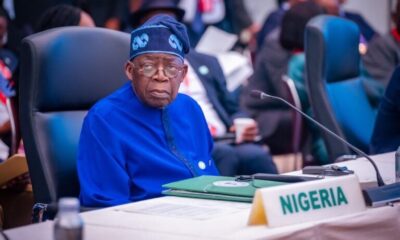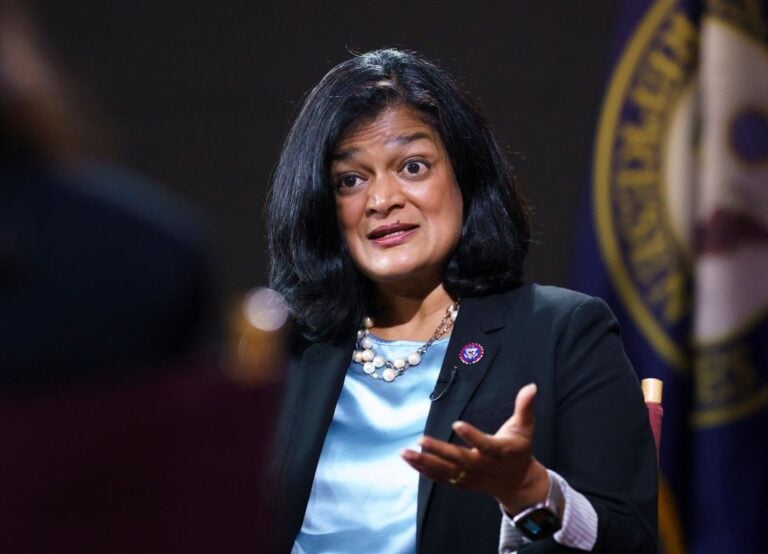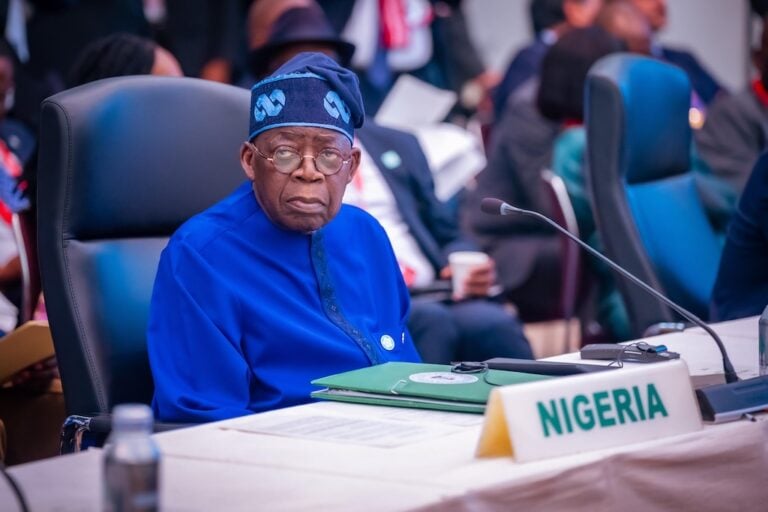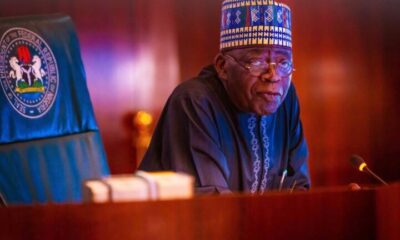BIG STORY
President Tinubu, Governors To Deploy 130,000 New Forest Guards Nationwide Over Rising Insecurity
Published
6 months agoon

- /home/porsch10/public_html/wp-content/plugins/mvp-social-buttons/mvp-social-buttons.php on line 27
https://porscheclassy.com/wp-content/uploads/2025/05/Bola-Tinubu.png&description=President Tinubu, Governors To Deploy 130,000 New Forest Guards Nationwide Over Rising Insecurity', 'pinterestShare', 'width=750,height=350'); return false;" title="Pin This Post">
- Share
- Tweet /home/porsch10/public_html/wp-content/plugins/mvp-social-buttons/mvp-social-buttons.php on line 69
https://porscheclassy.com/wp-content/uploads/2025/05/Bola-Tinubu.png&description=President Tinubu, Governors To Deploy 130,000 New Forest Guards Nationwide Over Rising Insecurity', 'pinterestShare', 'width=750,height=350'); return false;" title="Pin This Post">
To address the growing insecurity nationwide, President Bola Tinubu has sanctioned the launch of a national forest guard scheme and directed the hiring of more than 130,000 armed personnel to safeguard Nigeria’s 1,129 forest reserves.
This initiative, which received approval at Monday’s expanded Federal Executive Council meeting, requires each state to engage between 2,000 and 5,000 forest guards, depending on their individual capacity.
The responsibility for overseeing recruitment and training lies with the Office of the National Security Adviser alongside the Ministry of Environment.
Estimating around 3,500 recruits per state, the total number of forest guards to be deployed—including those in the Federal Capital Territory—would exceed 130,000.
Each state will be required to hire between 2,000 and 5,000 highly trained and heavily armed forest guards based on their budget, with the recruitment overseen by both the Office of the National Security Adviser and the Ministry of Environment.
A general calculation using 3,500 operatives per state places the projected total of forest guard recruits at no fewer than 130,000 across all states and the Federal Capital Territory.
According to a statement shared on Wednesday by the Special Adviser to the President on Media and Public Communication, Sunday Dare, on his X handle and titled: “Forest Guards Established by Federal Government,” the development was confirmed.
“President Tinubu has approved the establishment of forest guards and commencement of their employment to secure the 1,129 forests in the country.
“The President directed that the forest guards are to be well-trained and armed to perform their duties, which is essentially to flush out terrorists and criminal gangs hiding inside the forests for criminal activities.
“This recruitment is a security collaborative effort between the federal and state governments. The office of the NSA and the Ministry of Environment have been directed to take charge and ensure full implementation.
“Thousands of young Nigerians are expected to be employed as personnel of the outfit,” the statement read.
During a recent trip to Katsina State, the President emphasized that his government would not yield any part of the nation’s land to terrorists, bandits, or other armed groups operating within forest regions, asserting his commitment to reclaiming Nigeria’s forests.
Nigeria is home to more than 1,129 designated forest reserves, placing it among the African nations with the most extensive collection of protected forest zones.
These reserves vary in both size and how they are managed, with most under state authority. However, a number are federally controlled, particularly those designated as national parks or biosphere reserves.
Despite this, many of these forests are under serious threat due to illegal logging, farming encroachments, construction, and, more recently, security concerns, as some have become sanctuaries for criminal activity.
- States already acting
So far, no fewer than 11 states have activated forest security outfits—sometimes referred to as forest rangers or guards—though the new plan seeks to arm and scale these units up under a unified national approach.
The Nigerian Hunter and Forest Security Service currently lists commanders for the Niger, FCT, Kogi, and Benue state commands, indicating these states are already involved in forest security operations.
Other states may also have their own forest security outfits, although their structures and names can differ.
“Several states already have forest guards under their agriculture ministries. The plan is to now arm and upscale them under a unified national strategy,” said a Presidency insider who requested anonymity as they were not authorized to speak on the matter.
Earlier report ondicated that at least 10 states had started deploying forest guards to protect farmlands and remove criminal elements.
At a meeting held in February 2024 between President Bola Tinubu and state governors, an agreement was reached between the federal and state governments to recruit more forest rangers and enhance training with the goal of “keep our forests and our borders safe,” according to the Information Minister, Mohammed Idris, who briefed reporters afterward.
Sources say the President encouraged governors to further deliberate on forest guard strategies at the state level.
In a post-meeting conversation with our reporter, a government official who asked not to be named said, “The President told the state governors to discuss it further at the state level.
“A committee was set up for that. We have not heard from the committee yet. Don’t also forget that simultaneously, the National Assembly is considering inserting state policing in the constitution. So, there is a consensus around state policing.
“As for the forest guards, work is going on with it. There are existing forest guards in several states, but they are under the states’ ministries of agriculture. The goal now is to strengthen their capacity by arming them properly and recruiting more people.
“Still, it all falls in the hands of the states to strengthen the forest guards. That is where we are now.”
- Invasion worries governors
Governors in several states have voiced concern about the illegal occupation and incursion into forest reserves within their boundaries.
Although these incursions initially focused on exploiting natural resources and clearing land, they have now evolved into more dangerous threats, with terrorists and bandits establishing bases within the forests to launch attacks.
In Kwara State, reports of threats tied to the Kainji Lake National Park have surfaced. Following attacks carried out by the Mahmuda terrorist group in places such as Duruma and Kaiama, Governor AbdulRahman AbdulRazaq visited the affected communities to assess the damage.
The park, which straddles both Niger and Kwara states, has been highlighted as a possible entry route for armed groups crossing over from the Republic of Benin into Nigeria.
Kwara’s Upper Ogun Forest Reserve links Kainji Lake National Park to other areas, raising alarms about how easily criminals can navigate through these wooded regions.
In response to a recent attack in Kwara, the Chief of Army Staff, Lt Gen Olufemi Oluyede, ordered the troops at Sobi Barracks in Ilorin to flush out terrorist elements in the Kainji Dam area within a month, emphasizing the critical nature of the situation.
Beyond Kwara, several other states have reported challenges related to forest reserve invasions.
Benue State Governor, Hyacinth Alia, recently drew attention to foreign insurgents infiltrating local forests, blaming them for recent violent outbreaks.
The Old Oyo National Park, which borders several forest reserves, has also been recognized as a high-risk zone for criminal incursions, threatening nearby urban areas.
Oyo State Governor, Seyi Makinde, decried the movement of bandits into the Southern forests after they were forced out of other areas by military operations.
- Government recommendations
Based on advice from the governors, the President has permitted each state to recruit forest guards based on their available resources.
A Presidency official disclosed that states are expected to hire between 2,000 and 5,000 forest rangers depending on their financial strength.
He explained that the implementation and training will be coordinated by the Office of the NSA and the Ministry of Environment, and that the forest guards will be fully armed and trained to professional standards.
On the recruitment process, the source noted it would be stringent and closely monitored by security agencies, local leaders, and traditional authorities.
“Each state will determine its recruitment figures based on resources, with the Federal Government ensuring standardisation and coordination.
“Recruitment will be rigorous. Security agencies, traditional rulers, and community leaders will be involved. Forest guards will be armed and trained to the highest standards,” he said.
Attempts to reach the Director of Forestry in the Federal Ministry of Environment, Dr. Moses Ama, were unsuccessful as his phone remained switched off.
- Security experts react
Retired Army General, Peter Aro, welcomed the decision, describing it as a timely intervention aimed at addressing worsening insecurity in forested regions, particularly banditry, kidnapping, and insurgency.
Nonetheless, he warned that placing the new outfit under the dual supervision of the Ministry of Environment and the Office of the National Security Adviser could hinder its effectiveness and create administrative confusion.
“It represents a victory for those who have long championed a specialized response to forest-based threats like kidnapping and insurgency. However, this moment of triumph risks being squandered if the foundation is flawed. Assigning both the Ministry of Environment and the Office of the National Security Adviser to co-supervise this new outfit introduces the risk of power struggles, unclear directives, and bureaucratic confusion, especially regarding recruitment and procurement processes.”
He argued that the ONSA, while central to intelligence coordination, is not designed for the operational management of paramilitary services and should not be burdened with such a role.
“Handing it such roles threatens to derail the professionalism already embedded in the NFSS through years of field experience, internal vetting mechanisms, and the effective use of trusted local operatives, particularly traditional hunters,” he added.
According to Aro, the NFSS has already built a solid foundation through years of grassroots involvement, relying on trusted local operatives, including traditional hunters.
He cited their successes, particularly along the volatile Abuja-Kaduna rail corridor, as evidence of the organization’s capacity. Currently, the NFSS boasts a presence of 3,000 personnel in each state, including the Federal Capital Territory.
“This is not a job for just anyone. It requires experience and dedication.
“The Commandant-General, who funded and led this organisation from its private beginnings, deserves institutional continuity—not interference.”
Aro likened the NFSS to other national institutions such as the Nigeria Security and Civil Defence Corps and the Federal Road Safety Corps, which were allowed to mature into effective agencies.
He warned that failure to give the NFSS similar breathing room could doom the initiative.
A security analyst, Chidi Omeje, strongly criticised plans to deploy forest guards to tackle armed bandits in the forests, warning that such move could lead to unnecessary loss of lives.
“Which forest are we talking about? Isn’t it the same forest we’re seeing — the one filled with coordinated syndicates of bandits armed with all manner of weapons? What kind of weapons are we giving to these forest guards? Look, I wouldn’t want us to send them to their deaths.
“These forest guards cannot withstand the firepower of the kind of bandits we have in our forests.
“Our forests have become dens of heavily armed, well-trained criminals. Sending forest guards, probably with only shotguns or even AK-47s, is like sending them to their deaths.”
He argued that the nation’s current strategy should focus on bolstering military presence.
“We need more soldiers, more boots on the ground, and proper platforms with serious firepower.
“You can’t send forest guards into that situation. We’ll be harvesting deaths. They’ll be stuck in the middle like rats. I don’t support that idea.
“Well, if the plan is to complement existing efforts, then fine — but how exactly will they complement anything? What can they really do against those already in the forests? Haven’t we seen video clips showing how sophisticated these criminals are? How can forest guards confront that level of threat?”
Instead, Omeje advocated for the use of advanced technology and air support. “We should be talking about drones, aerial surveillance systems, and in some cases, even carpet bombing — based on verified intelligence.”
He maintained that only the military, supported by air and police forces, had the capability to reclaim Nigeria’s forests from armed groups.
Credit: The Punch
You may like
-


Nnamdi Kanu Moved From DSS Custody To Sokoto Prison — Lawyer
-


US Rep Asks Trump Not To Bully, Threaten Nigeria, Says “They’re Important To Us”
-


Alleged Genocide: US Congress Split Over Nigeria’s CPC Designation
-


Bandits ‘Demand N100m Ransom’ Per Victim From Families Of Abducted Kwara Worshippers
-


Alpha Morgan Bank Economic Review Webinar 18th Edition Holds In November
-


BREAKING: Terrorists Abduct Over 52 Students From Catholic School In Niger State
BIG STORY
Nnamdi Kanu Moved From DSS Custody To Sokoto Prison — Lawyer
Published
2 days agoon
November 21, 2025
Aloy Ejimakor, counsel to Nnamdi Kanu, says the leader of the Indigenous People of Biafra (IPOB) has been transferred from the Department of State Services (DSS) facility in Abuja to a correctional centre in Sokoto following his life sentence.
Ejimakor confirmed the development in a post on X, writing, “MAZI NNAMDI KANU has just been moved from DSS Abuja to the correctional facility (prison) in Sokoto; so far away from his lawyers, family, loved ones and wellwishers.”
On Thursday, James Omotosho, a judge of the federal high court in Abuja, convicted Kanu of terrorism.
Kanu received life imprisonment on counts one, four, five and six of the seven-count charge.
The court also handed him 20 years’ imprisonment on count three and five years on count seven.
Delivering judgment, Omotosho held that the prosecution had proven all the allegations against Kanu.
He said the IPOB leader failed to provide any credible defence and “deliberately refused’’ to contest the evidence presented during the trial.
The judge described Kanu as “a person who cannot be allowed to remain in the company of sane minds’’ and referred to him as an “international terrorist”.
Omotosho said Kanu’s conduct throughout the proceedings made him unsuitable for detention at Kuje prison.
He added that the IPOB leader had exhibited a violent tendency and must therefore be kept in protective custody in any suitable location in the country.
“I have no hesitation in coming to the conclusion that the convict has the tendency of violence. The tendency of violence has not left him,” Omotosho said.
“It is based on this that he must be kept in a facility that is suitable for his person, as putting him in Kuje Correctional Centre may not be appropriate.”
Omotosho also barred Kanu from using any electronic devices, including phones, except under the supervision of the Office of the National Security Adviser (ONSA), if the need arises.
The judge added that items recovered from Kanu, including the transmitter said to have been smuggled into the country, are to be forfeited to the federal government.
BIG STORY
US Rep Asks Trump Not To Bully, Threaten Nigeria, Says “They’re Important To Us”
Published
2 days agoon
November 21, 2025
Pramila Jayapal, a member of the United States house of representatives, has criticised President Donald Trump’s recent posture on allegations of Christian genocide in Nigeria, questioning the approach and the threats issued toward the country.
Trump had re-designated Nigeria as a “country of particular concern’’ and warned that the US military might enter Nigeria “guns-a-blazing to completely wipe out the Islamic terrorists who are committing these horrible atrocities”.
Speaking at a congressional hearing in Washington DC on Thursday, Jayapal said the framing of Christian persecution in Nigeria appeared “simplistic’’ and failed to reflect the nation’s “intersectional diversity”.
She explained that “Certainly, religion is a contributing factor to the violence, but a review by the Search for Common Ground found that in Nigeria’s Middle Belt region, religion was not a primary driver of conflict,” noting that communities across faith lines had been targeted by armed groups such as Boko Haram and ISIS West Africa. She added that clashes between farmer and herder groups were intensified by climate change and governance failures.
Jayapal expressed worry that Trump reacted after watching a Fox News clip, immediately threatening to go “guns-a-blazing’’ in Nigeria and withdraw US assistance. She then asked Jonathan Pratt, a senior official in the state department’s Bureau of African Affairs, to clarify the legal basis for any US military action inside Nigeria.
Before responding, Pratt stated that Marco Rubio, secretary of state, had directed his department to work jointly with Nigerian authorities on an action plan. He explained that “The secretary of state has directed us to put together a comprehensive plan that uses all tools at our disposal, including security and the Department of War, and this would be primarily focused on the security that we are providing to the government of Nigeria and how they are deploying their assets.” He added that information sharing, intelligence cooperation and counterterrorism support were central to the strategy.
Jayapal pressed further on why these tools were not the administration’s first response, to which Pratt said the state department had been consistently engaged in efforts to address insecurity in Nigeria. Jayapal argued that revising tactics was necessary for better results.
She said, “I just wish we would actually stick to that playbook rather than a bully and threaten of a country that is extremely important to us and to the region,” adding that Trump’s decision to post threats on Truth Social, including the phrase “guns-a-blazing”, was not appropriate.
During the hearing, congresswoman Sara Jacobs also condemned Trump’s comments, describing any threat of US military deployment in Nigeria as reckless. Jacobs stressed that congress had not authorised force and insisted that unilateral military action without Nigeria’s approval would violate international law.
BIG STORY
Alleged Genocide: US Congress Split Over Nigeria’s CPC Designation
Published
2 days agoon
November 21, 2025
Lawmakers, religious leaders, United States Department officials, and witnesses were divided in their views as the United States House Foreign Affairs Subcommittee on Africa on Thursday held an open hearing on President Donald Trump’s redesignation of Nigeria as “Country of Particular Concern” over alleged Christian genocide.
Following the redesignation, the President threatened that the US military would enter Nigeria “guns-a-blazing to completely wipe out the Islamic terrorists who are committing these horrible atrocities.”
The Chris Smith-led committee had convened the hearing to review the scope of religious persecution in Nigeria, potential policy responses, including targeted sanctions, humanitarian assistance, and collaboration with Nigerian authorities to prevent further violence.
The first set of panellists at the hearing held at Room 2172 of the Rayburn House Office Building and streamed live online were Senior Bureau Official of the Bureau of African Affairs, Jonathan Pratt, and Deputy Assistant Secretary of the Bureau of Democracy, Human Rights, and Labour, Jacob McGee, who faced numerous questions posed by the lawmakers.
The second panel featured presentations by the Director of the Centre for Religious Freedom, Ms Nina Shea; Bishop Wilfred Anagbe of Makurdi Catholic Diocese in Nigeria; and Ms Oge Onubogu of the Centre for Strategic and International Studies.
Setting the tone for the hearing, Chairman Chris Smith highlighted that 89 per cent of all Christians martyred worldwide are in Nigeria, with over 52,000 Christians slaughtered since 2009.
He accused militant Fulani herdsmen of committing acts of rape, kidnapping, and murder with “total impunity” from Nigerian officials.
Smith argued the attacks were unequivocally “religiously motivated” as he blamed the previous administration for weakening U.S. pressure by removing Nigeria from the “Country of Particular Concern” list, despite recommendations from the U.S. Commission on International Religious Freedom.
Furthermore, he emphasised that the U.S. will not be silent while people are persecuted and will not stop fighting until perpetrators are brought to justice.
He also pointed to the compelling and disturbing testimony of witnesses, such as Bishop Wilfred Anagbe of the Catholic Diocese of Makurdi, to underscore the severity of the crisis.
Giving his presentation, Senior Bureau Official of the Bureau of African Affairs, Jonathan Pratt, said the US was worried that the violent activities of extremist groups such as Boko Haram, ISIS West Africa, ISIS Sahel, Al-Qaeda affiliate Ansaru, and Lakurawa were now spreading beyond the North-East to other regions, particularly Nigeria’s Middle Belt.
“Terrorists, separatists, bandits and criminal militias in Nigeria are all over the country with ongoing attacks often deliberately targeting Christian communities,” Pratt said, adding that the violence in the Middle Belt reflects a “problem of prioritisation” by the government.
According to the US official, although Nigerian security forces are engaged in counter-terrorism operations and taking significant losses in the North-East, more needs to be done to protect vulnerable communities and hold perpetrators accountable.
“The administration’s approach intends to raise the protection of Christians to the top of Nigeria’s priorities, especially in the Middle Belt,” Pratt said.
He noted that Nigeria, as Africa’s largest democracy and a key regional partner, shares economic and security interests with the United States. Pratt said Washington welcomes Nigeria’s willingness to cooperate following its designation as a “Country of Particular Concern” and looks forward to seeing these commitments translated into concrete actions on the ground.
Pratt also revealed that the Trump administration is developing a plan to incentivise and compel the Nigerian government to strengthen security for Christian communities and improve religious freedom. The plan will involve engagement from the US State Department, Treasury and potentially the Department of War to bolster counter-terrorism and protection measures.
“The levels of violence and atrocities committed against Christians and communities of all faiths in Nigeria are appalling and threaten the universal right to religious freedom,” Pratt said. “We remain open to working together with the Nigerians, but we also expect the Nigerian government to deliver results on the ground as proof of their commitment to this universal right.”
Smith and Pratt’s initial remarks set the tone for a variety of reactions.
During the session, Representative John James, Representative of the people of Michigan’s 10th Congressional district, and a member of the Energy and Commerce Committee, said the designation is necessary to address what he described as a worsening crisis for Christians in Nigeria.
“Nigeria is facing one of the gravest religious freedom crises in the world. I have visited and have seen firsthand the direness of the conditions in what is now the deadliest place on earth to be a Christian,” James said.
He detailed the extent of the violence. “Since 2019, nearly 17,000 Christians have been killed. In the first seven months of this year alone, hundreds more were murdered. These are not isolated tragedies, but a sustained pattern of religiously motivated violence, often ignored or even enabled by the Nigerian government.
“Extremist groups like Boko Haram, Fulani militants, and ISIS West Africa attack often without any meaningful intervention from authorities. The lack of response has created an atmosphere of impunity where Christians continue to live in constant threat and fear.”
James also referenced the detention of Nnamdi Kanu, saying, “Religious persecution is tied to political repression and weakening institutions in Nigeria. The detention of Mazi Nnamdi Kanu is a clear example.
“In 2022, Nigeria’s Court of Appeals struck down the charges against him and ordered his release. The UN Working Group for Arbitrary Detention has also called for his unconditional release, yet he remains in solitary confinement in deteriorating health and recently had to represent himself in court.
“Nigeria has signalled that the law is optional and targeting Christians is fair game. Just hours ago this morning, despite the pleas and cries of Nigerian people and many Nigerian lawmakers, Kanu was convicted on all charges.”
In response to a question about the Nigerian government being infiltrated by extremist groups, Senior Bureau Official Jonathan Pratt of the US Department of State’s Bureau of African Affairs said, “I do not believe that the government of Nigeria has been infiltrated by jihadists.”
James pressed further on government response, asking, “because when you look at the selective enforcement of the rule of law, one might question if there is any favouritism or looking the other way when groups are being specifically targeted, despite the fact, as my colleague Moore mentioned, not enforcing the rule of law about weapons.
“My next question is, how has the Nigerian government reacted since President Trump’s country of particular concern designation announcement?”
Pratt replied, “They have taken the designation very seriously. There is a senior delegation here now.
“They will meet with the most senior officials of the US government this week, and we have already demarched the government in Abuja and here in Washington on the action plan, and I can say that the results so far have been positive in terms of cooperation.”
Speaking, Congressman Bill Huizenga criticised President Bola Tinubu’s administration for what he described as ongoing attacks by “radicalised Islamists” against Christians in Nigeria.
Huizenga, who said he grew up around Nigerians and has followed the country’s security challenges for years, accused both US lawmakers and the media of downplaying religious-related violence in Nigeria.
“I went to school with kids from Nigeria,” he said, pausing as he attempted to control his emotions.
“We’ve got neighbours who’ve been missionaries there, who have family there, who have friends there, who know this is going on.
“Yet, we’ve got not just the mass media, we’ve got people within the Congress denying that this is happening, or certainly de-emphasising it,” he said.
He said Christians, moderate Muslims and “anyone being terrorised by these radicalised Islamists in Nigeria” require stronger protection, arguing that the Nigerian government “is not doing enough.”
Huizenga also questioned the level of US humanitarian assistance to internally displaced persons in Benue and Taraba states, noting that Benue alone has “1.4 million” displaced people.
Concluding his remarks, he referenced a written submission from House Financial Services Committee Chairman, French Hill, who stressed the need for enforceable sanctions.
Similarly, A member of the United States House of Representatives, Johnny Olszewski, has expressed deep concern over the alleged inability of the Nigerian government to protect communities against insurgent attacks.
He stated, “The Nigerian government lacks the means to protect communities against groups that kill indiscriminately.
“To be clear, this does not abdicate the Nigerian government from responsibility.
“Muslims and Christians alike have lived under the constant threat of extreme groups like Boko Haram and ISIS West Africa for far too long. And so the real story here for me is not about Nigeria’s intent at the institutional level to persecute people based on faith.”
The lawmaker, who openly identified as a Christian, said the debate around Nigeria should not be framed as persecution by the government but as a critical “capacity problem” that has left millions exposed to extremist groups.
“Jesus Christ is my Lord and Saviour. I have no problem sharing that. I am also troubled by the state of religious freedom in Nigeria and around the world.
“So, I want to be clear upfront, violence against Christians in Nigeria is a serious issue. Christians are being massacred, and communities are living in constant fear. But this suffering is not just confined to one religious group,” he added.
Citing President Donald Trump’s senior adviser on Africa, Masabulo, the congressman noted that terrorism in Nigeria affects people irrespective of “colour, religion or tribe,” stressing that Muslims and Christians have equally endured persistent attacks from Boko Haram and ISIS-West Africa.
He, however, stressed that acknowledging this lack of capacity does not absolve Nigeria’s leaders of responsibility, warning that governance failures, corruption and neglect must be confronted.
“A government’s duty is to protect its people. And when there’s a failure to do so, whether that’s neglect or corruption or governance, leaders must be held accountable. But capacity within Nigerian institutions to maintain peace is a real question,” Olszewski stated.
The lawmaker also questioned the effectiveness of US policy towards Nigeria, calling for more meaningful support rather than threats of sanctions or military action.
“And we should be asking what the US is doing to help Nigeria build that capacity. Are we offering real partnerships or just threatening airstrikes and sanctions? Or instead, are we thinking about technical support, training and investment in the institutions that prevent violence in the first place?
“So let’s work together to fix what is broken. And I appreciate the ranking member for opening up this hearing with additional support options,” he said.
His remarks come amid renewed global scrutiny of insecurity in Nigeria, following the recent designation by President Donald Trump of Nigeria as a Country of Particular Concern.
During the session, Representative Pramila Jayapal warned against framing Nigeria’s violence as targeting only one religious group.
“But I appreciate that people have also recognised it isn’t just the persecution of Christians. This is persecution of multiple groups. And I think we have to be careful not to portray it just as persecution of Christians.
“That feels to me simplistic, and it doesn’t account for the intersectional diversity of Nigeria,” she said.
Citing research on drivers of conflict in Nigeria’s Middle Belt, Jayapal added that violence had affected both Christians and Muslims alike. She also expressed concern over Trump’s response to a televised report.
“I’m very concerned that a day after President Trump saw a clip on Fox News about the persecution of Christians in Nigeria, he threatened to go guns-a-blazing in Nigeria and revoke all assistance,” she said, noting that such a move would jeopardise health programmes critical to combating malaria and HIV.
Jayapal pressed officials on the legality of any US military action in Nigeria. “Can you tell me under what authority the US military strikes inside of Nigeria?” she asked.
Jayapal questioned whether the administration had considered diplomatic options before Trump’s public comments.
“Don’t you think it would have been appropriate to have the task force discussion and the alternatives presented prior to the president going on Truth Social and saying we’re going to go guns a-blazing into Nigeria?” she asked.
Pratt responded that Washington had long been engaged in Nigeria-related security and development issues.
“We have been working on these problems in Nigeria for a long time. We have a lot of programmes of assistance in the country. They did undergo a foreign assistance review, but many of them continue, and we want to make sure that we are using them strategically to get the best outcomes,” he said.
Jayapal, in closing, criticised what she described as a confrontational approach. “I just wish we would actually stick to that playbook rather than bully and threaten a country that is extremely important to us and to the region,” she said.
Quoting former US Ambassador Kelly Currie, she added, “You cannot solve problems created by men with guns by turning to men with guns for the solution.”
Christianity is facing the threat of extinction in Northern and Middle Belt regions of Nigeria, Bishop Wilfred Anagbe of the Diocese of Makurdi warned in a testimony before the United States House Subcommittee on Africa on Thursday.
The bishop said the country is entering one of its darkest periods for Christians as killings, mass displacement and targeted attacks continue with “impunity.”
Before the lawmakers, Anagbe declared that “Christianity risks elimination in parts of Northern and Middle-Belt Nigeria within a very short time,” describing the violence as a systematic effort to wipe out Christian communities and erase their cultural and religious identity.
The bishop said the ongoing crises marked by killings, kidnappings and widespread destruction have intensified despite recent international attention, including the redesignation of Nigeria as a Country of Particular Concern by US President Donald Trump.
He called that move “a serious, well-founded wakeup call.”
Reflecting on the deepening humanitarian catastrophe, he told US lawmakers, “Millions of displaced persons remain in camps, unable to return to their ancestral lands. This threatens cultural continuity, religious and economic survival.”
He added that women “endure sexual violence as a weapon,” warning that such tactics are designed to ensure that “no more Christians will be born from so many traumatised women.”
Anagbe recounted a series of recent violent incidents, including the May 22 attack on his hometown, where several of his relatives were killed.
“An entire convent of Reverend Sisters of the Order of St. Clare was displaced, along with the local Catholic parish,” he said.
He also described the attempted killing of one of his priests, Father Solomon Atongo, on May 24. “He was shot and left to die in the pool of his blood. Though he survived the attack, he is unable to walk freely because he has a broken bone.”
The bishop referenced attacks across Plateau, Benue, Kaduna and Kogi, including the June 13 massacre in Yelwata, Benue State, where he said 278 people—men, women and children—were slaughtered.
“It took the prayers of the Holy Father, Pope Leo XIV, for the government in Nigeria to even acknowledge this evil,” he said.
He accused the Federal Government of failing to confront the crisis.
“The government of Nigeria’s silence and refusal to engage in the fates of continued killings and displacements has deepened feelings of abandonment among the people,” he warned.
The bishop asked lawmakers pointedly, “Who is killing the Muslims up north? Is there any Christian militia displacing millions and occupying lands in Nigeria?”
According to the bishop, extremist groups—including Fulani militants, Boko Haram and ISWAP—are now pushing further South, worsening food insecurity and creating one of the largest displacement crises in Africa.
“Violence is spreading southward, displacing millions and destroying farmland,” he noted.
Anagbe thanked the subcommittee for its continued attention and reiterated his gratitude to President Trump.
“On behalf of millions of Christians in Nigeria and in the diaspora, we want to thank President Donald Trump for his bold leadership in designating Nigeria as a CPC,” he said.
But he insisted that words must be followed by action.
Among other steps, he called for targeted sanctions, expanded humanitarian support for internally displaced persons, and the passage of the Nigerian Religious Freedom and Accountability Act.
“This point cannot be overemphasised because it is impunity that fuels the violence we suffer,” he told the committee.
He urged allies to challenge discriminatory laws in Nigeria and push for the elimination of blasphemy laws.
As he closed, Anagbe warned that time is running out for Christian communities. “The church alone cannot stop the killings. It requires coordinated political, military and humanitarian intervention.”
His final plea was solemn and urgent: “Mr Chairman and members, we cannot afford to wait any longer. Please enact concrete actions according to the CPC designation. We all know that inaction emboldens the extremists even more.”
However, Congresswoman Sara Jacobs described President Donald Trump’s recent threat to deploy military action in Nigeria as “reckless.”
She cautioned against framing the situation solely in religious terms.
“Distorting what’s happening into a solely religious narrative erases the real drivers of violence and makes it harder to implement effective solutions, and it can fuel violence against the very groups the Trump administration claims it wants to protect,” she said.
Jacobs added, “That’s why I’m alarmed by President Trump’s rhetoric about this violence and threats to go into Nigeria ‘guns-a-blazing’ and to wipe out terrorists.
“We are already receiving reports of increased tensions between Christian and Muslim populations following this rhetoric. President Trump’s threat is reckless, and any unilateral military action in Nigeria would be illegal.
“Congress has not authorised force in Nigeria to protect Christians, and any action without Nigeria’s consent violates international law.”
The congresswoman also warned that a military-led approach could worsen civilian casualties and impunity, potentially fueling violent extremism.
“We need to use more tools from our foreign policy toolbox if we’re serious about helping Nigeria protect its citizens.
“That means we need to leverage diplomacy and engage with Nigeria on how we can help support their response while pushing for important reforms within Nigeria’s institutions,” she said.
Jacobs further emphasised the importance of funding programmes aimed at preventing violence and addressing the root causes of conflict.
In response to a question about the Nigerian government being infiltrated by extremist groups, Senior Bureau Official Jonathan Pratt of the US Department of State’s Bureau of African Affairs said, “I do not believe that the government of Nigeria has been infiltrated by jihadists.”
James pressed further on government response, asking, “because when you look at the selective enforcement of the rule of law, one might question if there is any favouritism or looking the other way when groups are being specifically targeted, despite the fact, as my colleague Moore mentioned, not enforcing the rule of law about weapons.
“My next question is, how has the Nigerian government reacted since President Trump’s country of particular concern designation announcement?”
Pratt replied, “They have taken the designation very seriously. There is a senior delegation here now.
“They will meet with the most senior officials of the US government this week, and we have already demarched the government in Abuja and here in Washington on the action plan, and I can say that the results so far have been positive in terms of cooperation.”
Credit: The Punch
Join Us On Facebook
Most Popular
-

 BIG STORY3 days ago
BIG STORY3 days agoBREAKING: Terrorists Abduct Over 52 Students From Catholic School In Niger State
-

 BIG STORY4 days ago
BIG STORY4 days agoEFCC Arrests Archbishop Of Faith Healing Ministry After Church Members Sprayed Naira Notes On Cow During Service In Warri
-

 BIG STORY4 days ago
BIG STORY4 days agoStrengthening Nigeria’s Key Sectors Amid Challenges And Opportunities In The Renewed Hope Agenda — Salisu Mohammed
-

 BIG STORY3 days ago
BIG STORY3 days agoDSS Files Fresh Terrorism Charges Against Ekpa-Linked IPOB Commanders, Secures Conviction Of ISWAP Leader
-

 BIG STORY3 days ago
BIG STORY3 days agoBREAKING: Court Convicts Nnamdi Kanu On Seven Terrorism Charges
-

 BIG STORY3 days ago
BIG STORY3 days agoBREAKING: Court Sentences Nnamdi Kanu To Life Imprisonment
-

 BIG STORY3 days ago
BIG STORY3 days agoBREAKING: Court Convicts Nnamdi Kanu On First Count Of Terrorism
-

 BIG STORY3 days ago
BIG STORY3 days agoLife Jail For Nnamdi Kanu: South-East Leaders Rally For Political Solution








